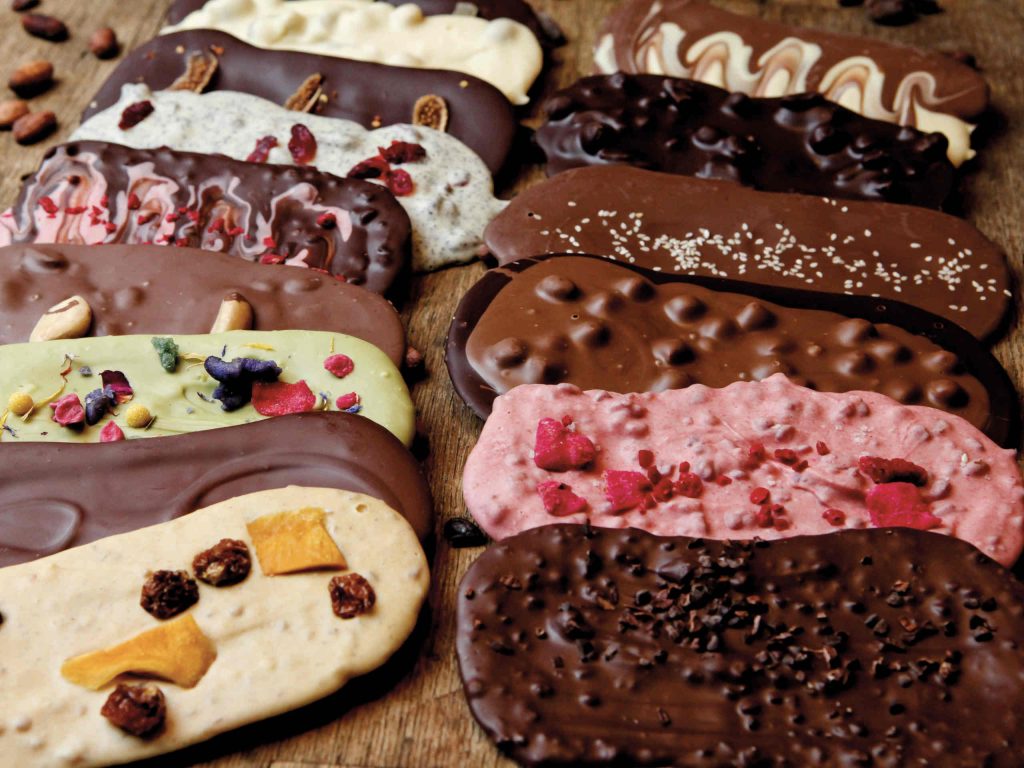| Editorial team
Chocolate always works. If you have been diligent as a reward. When you are doing well as a pleasure multiplier. When things go bad as a comforter. When you are under stress as a sedative. When you feel dull as a stimulant. An all-rounder – something that consumers value and that go straight for chocolate, as a glance at the sweet market shows.
The per capita sales of chocolate products in Germany alone amounted to 5.7 kilos in 2019. An increase to 6.3 kilos is forecast by 2025. This despite the fact that five years ago it was said that the European chocolate market was saturated. At that time, annual sales across the EU stagnated at just over four billion kilograms – which corresponds to around 40 billion bars.
The hype surrounding handmade chocolate bars with sometimes exotic flavor creations continues. This is due not least to an equally unshakeable to indestructible spirit of innovation. One of the most creative minds in the industry works in Erfurt. Over the past 16 years, Alex Kühn has built up and expanded his chocolate manufactory Goldhelm, which started out as a one-man show in a small store on the Krämerbrücke in Erfurt, into a small gourmet empire with supra-regional appeal. He now supplies more than 300 retailers throughout Germany and is knocking on the door of the Austrian market with increasing vehemence.
The Dutch brand Original Beans pursues the same concept - personal relationships with producers, direct supply routes and long-term contracts that are well above the market price and away from world market fluctuations. It is a radically sustainable approach that extends from cultivation and harvesting to processing and distribution. Customers come equally from the retail and food service sectors. The list of prominent brand ambassadors is long, ranging from Peter Gordon and Jamie Oliver to Thomas Scheiblhofer, Juan Amador, Tristan Brandt and Sabrina Ghayour. Awareness of the combination of sustainability and top quality continues to grow, and Original Beans does not believe the trend is slowing down. However, the concept at Original Beans is understood holistically. The company focuses on vegan chocolate, plastic-free, sometimes revolutionary, compostable packaging and plants a tree for every bar (which can be viewed directly via a QR code on the packaging) - so that in the end, every chocolate has a positive impact on the climate. Snacking while saving the world can be so easy.
In Austria, it has recently become possible to acquire the technical skills for this profession as part of a separate apprenticeship. The Chocolatier/Chocolatière training regulations came into force on August 1, 2021.

Vegan and reduced-sugar desserts that last, shine, and impress guests: Sugar is not the enemy, but it is not the solution either. Modern patisserie thinks ahead—more precisely, more plant-based, more consciously.
Away from the “sugar = taste” reflex, toward texture intelligence, aroma control, and clean technique. Modern patisserie works vegan, reduced-sugar—and often completely without classic table sugar. The matrix, process, and calculation are crucial. About desserts that perform professionally: stable, precise, highly aromatic.
In September, the 5,000-square-meter permaculture garden at the Falkensteiner Balance Resort Stegersbach reaches its full potential. This is when not only hotel gardener Paul Aschberger is called upon, but also chef Philipp Wildling. He quickly turns the tables and declares September to be vegan month: plant-based options become the norm and “conventional” diets with meat and milk become the alternative. With a selection of over 60 types of fruit and vegetables, as well as herbs and edible flowers, Wildling has an easy job.


Chocolate always works. If you have been diligent as a reward. When you are doing well as a pleasure multiplier. When things go bad as a comforter. When you are under stress as a sedative. When you feel dull as a stimulant. An all-rounder – something that consumers value and that go straight for chocolate, as a glance at the sweet market shows.
The per capita sales of chocolate products in Germany alone amounted to 5.7 kilos in 2019. An increase to 6.3 kilos is forecast by 2025. This despite the fact that five years ago it was said that the European chocolate market was saturated. At that time, annual sales across the EU stagnated at just over four billion kilograms – which corresponds to around 40 billion bars.